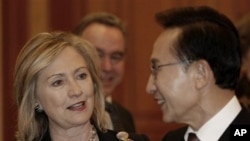U.S. Secretary of State Hilary Clinton has wrapped up a two-day visit to South Korea. On Sunday she and President Lee Myung-bak reaffirmed their support for ratification of a bilateral free trade agreement as well as for continued cooperation in Afghanistan and Libya. But, how to engage North Korea remains a lingering concern.
Secretary of State Hilary Clinton and South Korean President Lee Myung Bak held talks Sunday morning at the President’s office in Seoul.
During her two-day visit here, Clinton reaffirmed Washington’s commitment to improving bilateral ties with South Korea as well as further cooperation on global concerns.
In recent years South Korea and the US have worked closely together on issues such as piracy, climate change and most prominently the war in Afghanistan, says Daniel Pinkston, North East Asia Deputy Project Director of the International Crisis Group in Seoul.
"The South Koreans have been providing support through some engineering units, and through training of police and military in Afghanistan, construction, those types of things," he said.
Secretary Clinton and President Lee also pledged to press for passage of a bilateral free trade agreement that is still waiting ratification by legislators in both countries. Speaking earlier at the US Chamber of Commerce in Seoul, Clinton said that the pact would strengthen the US-South Korea alliance.
However, the most pressing issue for both Seoul and Washington is still how to convince North Korea to give up its nuclear weapons program. Multinational talks have been in a standstill for more than two years.
But Daniel Pinkston says there’s another concern that both the US and South Korea should be addressing. The World Food Program and other aid groups say the North will soon face another sever food deficit and millions could go hungry. Pinkston says the two governments might not agree on whether to help North Korea.
"There might be some splits or divisions between Washington and Seoul on that issue. The WFP, FAO, UNICEF report that came out last month painted a pretty bleak picture coming up in the late spring and summer," said Pinkston. "So if there is a humanitarian crisis in North Korea, its getting pretty late to provide assistance”"
South Korea was once North Korea’s biggest aid donor, but assistance ended when President Lee took office in 2008. The government here has so far said that it will not resume food aid despite the concerns of humanitarian groups.
Clinton Pledges Continued Cooperation With South Korea




